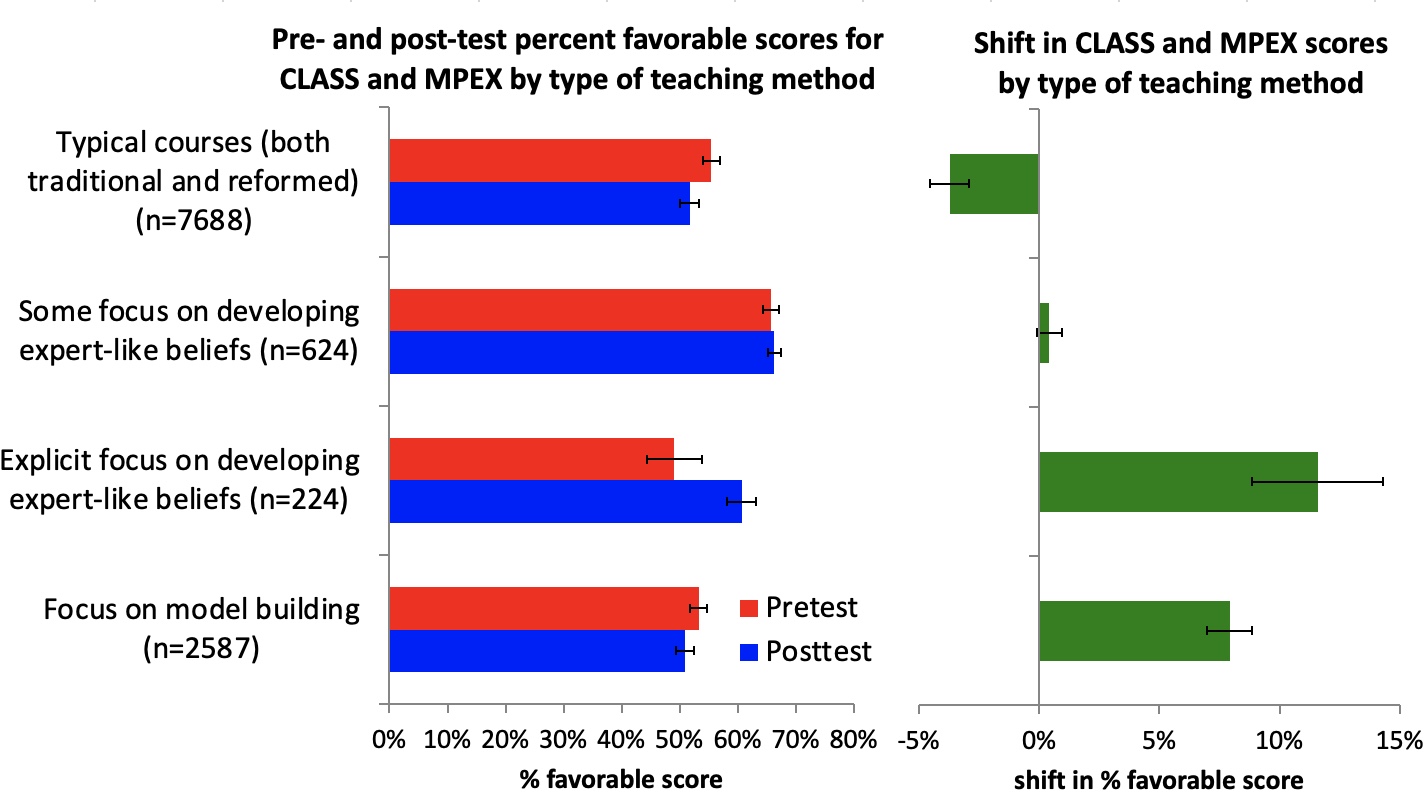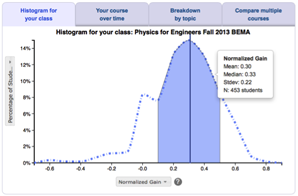Developed by E. F. Redish, J. M. Saul, & R. N. Steinberg
| Purpose | To probe some aspects of student expectations in physics courses and measure the distribution of student views at the beginning and end of the course. |
|---|---|
| Format | Pre/post, Multiple-choice, Agree/disagree |
| Duration | 20-30 min |
| Focus | Beliefs / Attitudes (epistemological beliefs) |
| Level | Upper-level, Intermediate, Intro college, High school |
Sample questions from the MPEX:
A significant problem in this course is being able to memorize all the information I need to know.
Strongly Disagree 1 2 3 4 5 Strongly Agree
Knowledge in physics consists of many pieces of information each of which applies primarily to a specific situation.
Strongly Disagree 1 2 3 4 5 Strongly Agree
more details
This is the highest level of research validation, corresponding to all seven of the validation categories below.
Research Validation Summary
Based on Research Into:
- Student thinking
Studied Using:
- Student interviews
- Expert review
- Appropriate statistical analysis
Research Conducted:
- At multiple institutions
- By multiple research groups
- Peer-reviewed publication
The questions on the MPEX were chosen through literature review, discussion with faculty and the researchers’ personal experiences. Over 100 hours of student interviews were conducted to validate that students read and interpreted the questions in the way intended. MPEX data was collected from calibration groups with varying expertise in physics to confirm that MPEX scores increased with increasing experience in physics. Appropriate statistical analyses were conducted and the MPEX was found to be reliable and have good internal consistency. The MPEX has been administered at over 10 institutions with over 1500 students at varying course levels and teaching methods.
References
- A. Elby, Helping physics students learn how to learn, Am. J. Phys. 69 (S1), S54 (2001).
- A. Madsen, S. McKagan, and E. Sayre, How physics instruction impacts students’ beliefs about learning physics: A meta-analysis of 24 studies, Phys. Rev. ST Phys. Educ. Res. 11 (1), 010115 (2015).
- J. Marx and K. Cummings, What Factors Really Influence Shifts in Students' Attitudes and Expectations in an Introductory Physics Course?, presented at the Physics Education Research Conference 2006, Syracuse, New York, 2006.
- C. Omasits and D. Wagner, Investigating the Validity of the MPEX Survey, presented at the Physics Education Research Conference 2005, Salt Lake City, Utah, 2005.
- E. Redish, J. Saul, and R. Steinberg, Student expectations in introductory physics, Am. J. Phys. 66 (3), 212 (1998).
- J. Saltzman, M. Price, and M. Rogers, Initial study of neutral post-instruction responses on the Maryland Physics Expectation Survey, Phys. Rev. Phys. Educ. Res. 12 (1), 013101 (2016).
- J. Santana-Fajardo, Gain in learning the force concept and change in attitudes toward Physics in students of the Tonala High School, CienciaUAT 13 (1), 65 (2018).
- J. Saul, Beyond problem solving: Evaluating introductory physics courses through the hidden curriculum, Dissertation, University of Maryland, 1998.
- J. Saul, R. Steinberg, and E. Redish, Comparison of student expectations in introductory calculus-based physics courses, AAPT Announcer 26 (2), 98 (1996).
- U. Wutchana and N. Emarat, Student effort expectations and their learning in first-year introductory physics: A case study in Thailand, Phys. Rev. ST Phys. Educ. Res. 7 (1), 010111 (2011).
PhysPort provides translations of assessments as a service to our users, but does not endorse the accuracy or validity of translations. Assessments validated for one language and culture may not be valid for other languages and cultures.
| Language | Translator(s) | |
|---|---|---|
| Spanish | José Luis Santana Fajardo |
If you know of a translation that we don't have yet, or if you would like to translate this assessment, please contact us!
Download the MPEX answer key.
Score the MPEX on the PhysPort Data Explorer
With one click, you get a comprehensive analysis of your results. You can:
- Examine your most recent results
- Chart your progress over time
- Breakdown any assessment by question or cluster
- Compare between courses
Download the MPEX scoring tool.
| Typical Results |
|---|
In typical physics classes, students’ beliefs usually deteriorate or at best stay the same. There are a few types of interventions, including an explicit focus on model-building and/or developing expert-like beliefs that appear to lead to significant improvements in beliefs. Small courses and those for elementary education and non-science majors also result in improved beliefs. However, because the available data oversamples certain types of classes, it is unclear what leads to these improvements. This figure from Madsen et. al 2015 shows CLASS (n=9296) and MPEX (n=1316) pre- and post-test scores and shifts for a variety of teaching methods. The CLASS and MPEX are similar in the way they measure students' beliefs about physics and learning physics, so the scores for these tests have been combined.
|
The latest version of the MPEX, released in 1997, is version 4.0.







